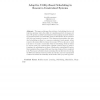Free Online Productivity Tools
i2Speak
i2Symbol
i2OCR
iTex2Img
iWeb2Print
iWeb2Shot
i2Type
iPdf2Split
iPdf2Merge
i2Bopomofo
i2Arabic
i2Style
i2Image
i2PDF
iLatex2Rtf
Sci2ools
111
Voted
AUSAI
2005
Springer
2005
Springer
Adaptive Utility-Based Scheduling in Resource-Constrained Systems
This paper addresses the problem of scheduling jobs in soft real-time systems, where the utility of completing each job decreases over time. We present a utility-based framework for making repeated scheduling decisions based on dynamically observed information about unscheduled jobs and system’s resources. This framework generalizes the standard scheduling problem to a resource-constrained environment, where resource allocation (RA) decisions (how many CPUs to allocate to each job) have to be made concurrently with the scheduling decisions (when to execute each job). Discrete-time Optimal Control theory is used to formulate the optimization problem of finding the scheduling/RA policy that maximizes the average utility per time step obtained from completed jobs. We propose a Reinforcement Learning (RL) architecture for solving the NP-hard Optimal Control problem in real time, and our experimental results demonstrate the feasibility and benefits of the proposed approach. Content Area...
Artificial Intelligence | AUSAI 2005 | Optimal Control | Scheduling Decisions | Standard Scheduling Problem |
| Added | 26 Jun 2010 |
| Updated | 26 Jun 2010 |
| Type | Conference |
| Year | 2005 |
| Where | AUSAI |
| Authors | David Vengerov |
Comments (0)

